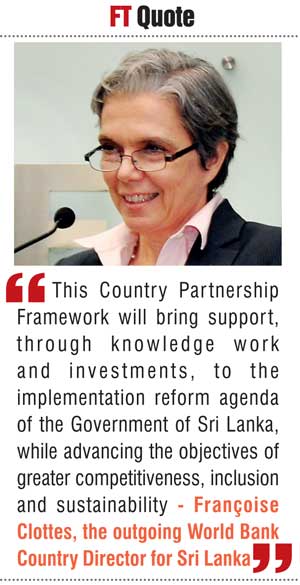Sunday Feb 15, 2026
Sunday Feb 15, 2026
Monday, 1 August 2016 00:00 - - {{hitsCtrl.values.hits}}
 The World Bank Group’s Board of Directors has endorsed a new four-year strategy aimed at achieving greater prosperity for Sri Lanka and its people.
The World Bank Group’s Board of Directors has endorsed a new four-year strategy aimed at achieving greater prosperity for Sri Lanka and its people.
The strategy emphasises greater macroeconomic stability, creating more and better jobs, improving Sri Lanka’s global competitiveness, investing in underserved people and areas, and promoting green growth.
The World Bank Group’s Country Partnership Framework (CPF) for Sri Lanka for the period ending June 2020, reflects the development vision of the Government. It draws on the priorities identified in an earlier World Bank analysis of the opportunities and challenges facing the country’s economy, Systematic Country Diagnostic.
The areas identified for support are those in which the World Bank Group (WBG) has a comparative advantage and where there are opportunities to leverage the private sector to provide sustainable solutions to the country’s development challenges. Through online consultations and face-to-face consultations in Matara, Jaffna, Batticaloa, Kandy and Colombo, the general public was able to participate in shaping the strategy.
“The Country Partnership Framework for Sri Lanka is prepared in close collaboration with Government counterparts and through an extensive consultation process with beneficiaries,” said Françoise Clottes, the outgoing World Bank Country Director for Sri Lanka and the Maldives. “This CPF will bring support, through knowledge work and investments, to the implementation reform agenda of the Government of Sri Lanka, while advancing the objectives of greater competitiveness, inclusion and sustainability.”
The CPF’s policy reform emphasis mirrors the strong policy reform orientation of the Government, particularly in the areas related to improving macro-fiscal stability, enhancing the enabling environment for private sector development, export competitiveness and global integration.
Support for improving living standards in the lagging regions, including the conflict-affected areas of the Northern and Eastern regions, and strengthening education and training systems are viewed as indispensable to promoting social inclusion.
Additionally, the CPF focuses on balancing development with environmental conservation and enhancing resilience to climate change, which entails protecting and managing the country’s extraordinary natural assets for sustained growth.
“More and better jobs for the bottom 40% of the population through a more competitive economy that integrates with global value chains, inclusion of vulnerable and neglected people and areas and seizing opportunities for environmentally friendly growth, sum up the three pillars of the Country Partnership Framework for Sri Lanka,” said Rolande Pryce, Operations Advisor and Task Team Leader of the CPF. “Improving gender equality and strengthening governance are two critical themes woven through the design of the Country Partnership Framework’s program of activities.”
The World Bank Group comprises the International Development Association and International Bank for Reconstruction and Development, which provide financing and analytical and advisory support to governments; the International Financial Corporation (IFC), which provides financing and advisory support services for the private sector; and the Multilateral Investment Guarantee Agency (MIGA), which provides risk insurance to promote investment.
The WBG’s activities are guided by a Country Partnership Framework (CPF) which is agreed upon with the Government of Sri Lanka; the CPF which will shape the collaboration for the next four years until June 2020. The World Bank’s current portfolio consists of $ 1.8 billion in financing commitments and IFC has a portfolio of private sector financing commitments of over $ 230 million.
The World Bank Board has approved $ 100 million in credit from the International Development Association (IDA) to support the Government of Sri Lanka’s economic reform program.
Sri Lanka has been making steady progress on economic reforms, with the Government aiming to create one million new jobs through a reform package focused on improving the country’s competitiveness, transparency and macroeconomic stability.
A recent World Bank study, the Systematic Country Diagnostic, highlighted the need for Sri Lanka to move from a largely inward looking and public sector driven economy to one that is capable of unleashing the potential of the private sector – leading to post-conflict economic growth and creating more and better jobs for Sri Lankans.
The Sri Lanka Competitiveness, Transparency and Fiscal Sustainability Development Policy Financing (DPF), which is only the second DPF to Sri Lanka in a decade, aims to support the Government’s reform agenda by reducing obstacles to private sector competitiveness, establishing transparent and well managed public institutions and improving fiscal sustainability.
“The breadth and depth of the actions implemented signal the comprehensive approach and commitment of the Government to tackle difficult reforms aimed at making growth sustainable and creating jobs.” said Françoise Clottes, World Bank Country Director for Sri Lanka and the Maldives. “The specific actions in this DPF operation will help improve fiscal sustainability and create the fiscal space for delivery of public services, social spending and capital investment, which are integral to the country’s competitiveness.”
The Ministry of National Policies and Economic Affairs will be responsible for overall implementation and coordination of the proposed operation. Other agencies involved include the Ministry of Development Strategies and International Trade, the Ministry of Finance, the Ministry of Parliamentary Reforms and Mass Media, the Auditor General’s Department, the Board of Investment and the Central Bank of Sri Lanka.
“Improving a country’s competitiveness and creating more jobs are complex objectives that require a number of factors – a stable macroeconomic environment, good governance, adequate investment climate and skills in demand,” said Emanuel Salinas Munos, Program Leader and Task Team Leader of the World Bank.
“This program will support the Sri Lankan Government’s commitment to enable the potential of Sri Lankan enterprises to grow, become more productive and better integrate with the global economy.”
DPF operations provide untied funding to the Government upon completion of a package of policy and institutional reforms. The funding provided is allocated by the Government solely based on its budgetary priorities. The World Bank Group provides technical assistance to the Government in support of its reform efforts under this program.